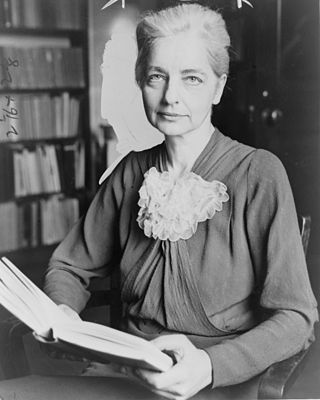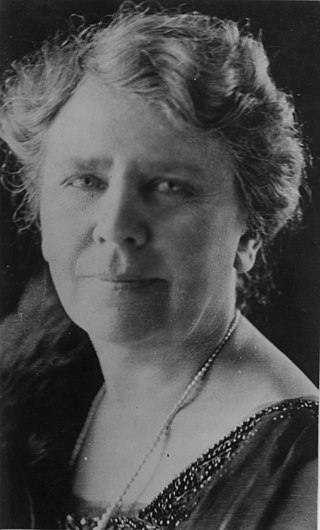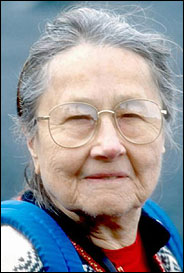Related Research Articles

Cultural anthropology is a branch of anthropology focused on the study of cultural variation among humans. It is in contrast to social anthropology, which perceives cultural variation as a subset of a posited anthropological constant. The term sociocultural anthropology includes both cultural and social anthropology traditions.

Margaret Mead was an American cultural anthropologist, author and speaker, who appeared frequently in the mass media during the 1960s and the 1970s.

Ruth Fulton Benedict was an American anthropologist and folklorist.

Frank Hamilton Cushing was an American anthropologist and ethnologist. He made pioneering studies of the Zuni Indians of New Mexico by entering into their culture; his work helped establish participant observation as a common anthropological research strategy. In recent years, however, questions have emerged about Cushing's activities among the Zuni. Consequently, Frank Cushing's work provides an important case study for considering the ethics of both ethnographic research and the generation of museum collections.
Lois Wendland Banner is an American author and emeritus professor of history at the University of Southern California. She is one of the earliest academics to focus on women's history in the United States. Her work includes biographies of Margaret Mead, Ruth Benedict, Marilyn Monroe and Greta Garbo as well as the textbook Women in Modern America: A Brief History.

Coming of Age in Samoa: A Psychological Study of Primitive Youth for Western Civilisation is a 1928 book by American anthropologist Margaret Mead based upon her research and study of youth – primarily adolescent girls – on the island of Taʻū in American Samoa. The book details the sexual life of teenagers in Samoan society in the early 20th century, and theorizes that culture has a leading influence on psychosexual development.

Frances Theresa Densmore was an American anthropologist and ethnographer born in Red Wing, Minnesota. Densmore studied Native American music and culture, and in modern terms, she may be described as an ethnomusicologist.

Matilda Coxe Stevenson, who also wrote under the name Tilly E. Stevenson, was the first woman ever employed as an anthropologist in the U.S. She was also the first female anthropologist to study the Native Americans of New Mexico. She pioneered the use of photography in ethnology.
Feminist anthropology is a four-field approach to anthropology that seeks to transform research findings, anthropological hiring practices, and the scholarly production of knowledge, using insights from feminist theory. Simultaneously, feminist anthropology challenges essentialist feminist theories developed in Europe and America. While feminists practiced cultural anthropology since its inception, it was not until the 1970s that feminist anthropology was formally recognized as a subdiscipline of anthropology. Since then, it has developed its own subsection of the American Anthropological Association – the Association for Feminist Anthropology – and its own publication, Feminist Anthropology. Their former journal Voices is now defunct.
Esther Newton is an American cultural anthropologist who performed pioneering work on the ethnography of lesbian and gay communities in the United States.

Elsie Worthington Clews Parsons was an American anthropologist, sociologist, folklorist, and feminist who studied Native American tribes—such as the Tewa and Hopi—in Arizona, New Mexico, and Mexico. She helped found The New School. She was associate editor for The Journal of American Folklore (1918–1941), president of the American Folklore Society (1919–1920), president of the American Ethnological Society (1923–1925), and was elected the first female president of the American Anthropological Association (1941) right before her death.

Ruth Landes was an American cultural anthropologist best known for studies on the Brazilian religion of Candomblé and her published study on the topic, City of Women (1947). Landes is recognized by some as a pioneer in the study of race and gender relations.
Esther Schiff Goldfrank was an American anthropologist of the famous German-American Schiff family. She had studied with Franz Boas and specialized in the Pueblo Indians. She worked closely with Elsie Clews Parsons and also with Ruth Benedict on the Blackfoot. She published on Pueblo religion, Cochiti sociology and Isleta drawings. Goldfrank received her bachelor's degree from Barnard College in 1918 and graduated from Columbia University in 1937.

Gene Weltfish was an American anthropologist and historian working at Columbia University from 1928 to 1953. She had studied with Franz Boas and was a specialist in the culture and history of the Pawnee people of the Midwest Plains. Her 1965 ethnography, The Lost Universe: Pawnee Life and Culture, is considered the authoritative work on Pawnee culture to this day.

Frederica ("Freddy") Annis Lopez de Leo de Laguna was an American ethnologist, anthropologist, and archaeologist influential for her work on Paleoindian and Alaska Native art and archaeology in the American northwest and Alaska.
Ruth Leah Bunzel was an American anthropologist, known for studying creativity and art among the Zuni people (A:Shiwi), researching the Mayas in Guatemala, and conducting a comparative study of alcoholism in Guatemala and Mexico. Bunzel was the first American anthropologist to conduct substantial research in Guatemala. Her doctoral dissertation, The Pueblo Potter (1929) was a study of the creative process of art in anthropology and Bunzel was one of the first anthropologists to study the creative process.

Helen Heffron Roberts (1888–1985) was an American anthropologist and pioneer ethnomusicologist. Her work included the study of the origins and development of music among the Jamaican Maroons, and the Puebloan peoples of the American southwest. Her recordings of ancient Hawaiian meles are archived at the Bernice P. Bishop Museum in Honolulu. Roberts was a protege of Alfred V. Kidder and Franz Boas.

Gitel (Gertrude) Poznanski Steed was an American cultural anthropologist known for her research in India 1950–52 involving ethnological work in three villages to study the complex detail of their social structure. She supplemented her research with thousands of ethnological photographs of the individuals and groups studied, the quality of which was recognised by Edward Steichen. She experienced chronic illnesses after her return from the field, but nevertheless completed publications and many lectures but did not survive to finish a book The Human Career in Village India which was to integrate and unify her many-sided studies of human character formation in the cultural/historical context of India.
Laurencita R. Herrera (1912–1984) was a renowned Native American Cochiti Pueblo artist, specializing in traditional Cochiti figurative pottery called storytellers and her pottery vessels. She is of the Herrera family, a renowned family of Pueblo potters in New Mexico, whose work is often found in art collections and art museums. She was an actively making pottery between the 1930s through the 1970s and is known as one of the, "finest Cochiti potters of that era".
May Mandelbaum Edel was an American anthropologist known for her fieldwork among the Okanagan in Washington, the Tillamook in Oregon, and the Kiga in Uganda. Edel's linguistic research of the Tillamook serves as the only published account of the language which provided data for future linguistic publications. Edel was the first American woman anthropologist to live in an African village, and her research in Africa documented the diversity of African cultures.
References
- ↑ Benedict, Ruth (1931). Tales of the Cochiti Indians. Smithsonian Institution, Bureau of American Ethnology Bulletin 98
- ↑ Lavender, Catherine Jane (2006). Scientists and storytellers: Feminist anthropologists and the construction of the American Southwest. UNM Press, ISBN 978-0-8263-3868-6
- ↑ Lapsley, Hilary (2001). Margaret Mead and Ruth Benedict: The Kinship of Women. University of Massachusetts Press, ISBN 978-1-55849-295-0
- ↑ Babcock, Barbara A. (1992). "Not in the Absolute Singular": Re-Reading Ruth Benedict. Frontiers: A Journal of Women Studies, Vol. 12, No. 3, 1992, p. 39 ff.
- ↑ Radner, Joan Newlon (1993). Feminist messages: coding in women's folk culture, p. 228. University of Illinois Press, ISBN 978-0-252-06267-4